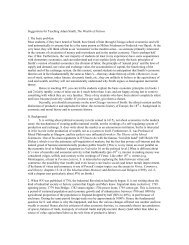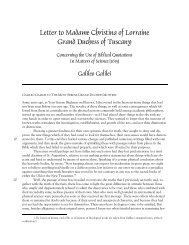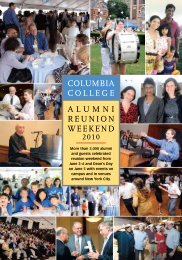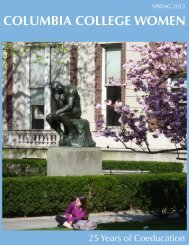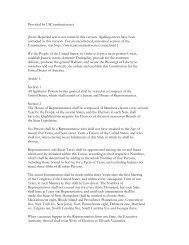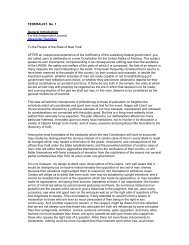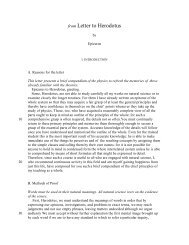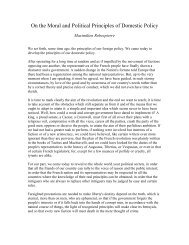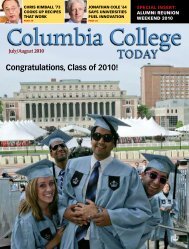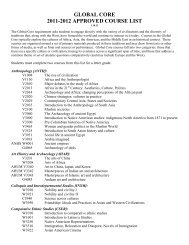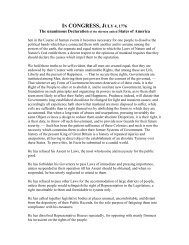Download this issue as a PDF - Columbia College - Columbia ...
Download this issue as a PDF - Columbia College - Columbia ...
Download this issue as a PDF - Columbia College - Columbia ...
Create successful ePaper yourself
Turn your PDF publications into a flip-book with our unique Google optimized e-Paper software.
FACULTY FIND LIT HUM CHALLENGING, FULFILLING<br />
COLUMBIA COLLEGE TODAY<br />
COLUMBIA COLLEGE TODAY<br />
FACULTY FIND LIT HUM CHALLENGING, FULFILLING<br />
time period, they’re very close to us in life experience.”<br />
“There’s a collegial <strong>as</strong>pect,” says Joanna Stalnaker, <strong>as</strong>sociate<br />
professor of French, who h<strong>as</strong> taught Lit Hum for seven of her 11<br />
years at <strong>Columbia</strong>. “Everyone is reading the same works at the<br />
same time. There are very few colleges where that’s taking place,<br />
and that’s the most valuable thing I can think of. This course<br />
sends a message that literature matters and is central to a college<br />
education, and that’s something that’s endangered right now.”<br />
“That’s what we do at <strong>Columbia</strong>: Lit Hum and CC,” says<br />
Michael Seidel, a retired professor of English who taught Lit<br />
Hum for 30 years after coming to <strong>Columbia</strong> from Yale in 1977.<br />
“There’s really nothing like it in the country, because of its history,<br />
its intensity, that it’s a seminar and because it’s <strong>Columbia</strong><br />
students. I read those books with the same intensity the l<strong>as</strong>t time<br />
I taught it <strong>as</strong> the first time.” Seidel adds that he misses Lit Hum<br />
and sometimes wakes up longing to teach a cl<strong>as</strong>s.<br />
Lit Hum’s teachers hail from humanities departments such <strong>as</strong><br />
English and comparative literature, philosophy, theater, cl<strong>as</strong>sics and<br />
anthropology. The course includes about 65 sections, which puts<br />
it in constant need of those willing and able to take on the rigors<br />
of teaching it. (The aim is for the faculty to be evenly divided with<br />
a third tenured faculty, a third junior faculty and a third graduate<br />
student preceptors.) Many instructors read the <strong>as</strong>signed text before<br />
cl<strong>as</strong>s, and not just the first time they teach the course, but every time.<br />
“Anybody who reads books for a living never feels it’s the same<br />
thing over and over again,” Seidel says. “The books reveal themselves<br />
over time, with new insights and new ways of reading.”<br />
Elisabeth Ladenson Ph.D. ’94 GSAS, professor of French and<br />
comparative literature and chair of the Department of French and<br />
Romance Philology, reads each work itself plus <strong>as</strong> much <strong>as</strong> she<br />
can get her hands on about the work. “I’m old-f<strong>as</strong>hioned, so it’s<br />
not Wikipedia I’m going to rely on,” she says. “It’s The Cambridge<br />
Companion to Virgil, dictionaries of mythology and things like<br />
that. It’s not just the work; it’s the context of the work, the author’s<br />
life, the influences of the work, mythological references. I<br />
prepare for cl<strong>as</strong>s surrounded by dictionaries and reference works<br />
and critiques of the work.”<br />
Another challenge to teachers is inherent in the nature of the<br />
course: With such a range of works, many are bound to lie outside<br />
the scope of individual expertise. “Some people only feel comfort-<br />
Gareth Williams, the Violin Family Professor of Cl<strong>as</strong>sics and chair of Lit Hum, conducts a weekly seminar for graduate preceptors who are<br />
teaching the course for the first time.<br />
PHOTO: MICHAEL DiVITO<br />
“You can teach the course only one way,<br />
and that’s with humility. The works are so<br />
much greater than any of us.”<br />
able teaching material they know intimately. Putting yourself<br />
in front of the major works of civilization is intimidating,”<br />
Seidel says. “You can teach the course only one way,<br />
and that’s with humility. The works are so much greater<br />
than any of us. You don’t really teach it — you read the<br />
books alongside a lot of smart people, both people teaching<br />
the course and the <strong>Columbia</strong> students.”<br />
For first-time and any veteran instructors who choose to<br />
attend, a Wednesday lunch forum, with a guest speaker on<br />
the upcoming text, helps them prepare for the week ahead.<br />
The Witten Center for the Core Curriculum, meanwhile,<br />
maintains a library of resources online and at its office in<br />
Hamilton Hall. And the Lit Hum chair keeps materials —<br />
notes, articles, hand-outs — that have been p<strong>as</strong>sed down<br />
through the years.<br />
“The first year is an Iliad,” Rosen says. “You barely<br />
have time to read the work yourself before you’re with<br />
the students teaching it. It w<strong>as</strong> life-saving that I had<br />
generous colleagues who shared their Lit Hum notes<br />
and offered guidance.”<br />
Though she h<strong>as</strong> taught the course four times, Rosen<br />
still attends every Wednesday presentation. “I love thinking<br />
about the work in the company of other people who<br />
also want to think about these texts,” she says.<br />
Seidel attended the Wednesday discussions every<br />
week for decades and found them one of the most enjoyable<br />
<strong>as</strong>pects of teaching the course. “They were always<br />
fruitful, with f<strong>as</strong>cinating insights that were invaluable<br />
to the health and vitality of the course,” he says, adding<br />
that he especially enjoyed getting to know colleagues<br />
from other departments — historians, anthropologists,<br />
philosophers, sociologists — who brought their own<br />
perspectives. “That had a tremendous impact on my<br />
work through the years and in the way I approached<br />
the whole academic experience.”<br />
The greatest challenge (and sometimes an enticement)<br />
for first-timers lies in developing even a b<strong>as</strong>ic knowledge of all<br />
the books. “These are towering works. One could spend one’s life<br />
studying any one of them,” Stalnaker says. “I’d never read Homer<br />
or Virgil or the Bible. I w<strong>as</strong> coming into it with complete ignorance<br />
and loved the idea of reading these books myself. I now<br />
think it’s crazy to work in literature and not have any knowledge<br />
of the Bible [for example], because it’s so influential in the history<br />
of Western literature and in our language.”<br />
In addition to the Wednesday talk, first-time graduate preceptors<br />
are required to attend a Friday seminar series, led by the chair<br />
of Lit Hum — currently Gareth Williams, the Violin Family Professor<br />
of Cl<strong>as</strong>sics and chair of the Department of Cl<strong>as</strong>sics — on<br />
how best to teach the course. Still, <strong>as</strong>ide from the required readings<br />
and a standardized final exam, the faculty is given a good<br />
deal of free rein in how to approach their cl<strong>as</strong>ses. One’s approach<br />
might lean toward the historical, cl<strong>as</strong>sical, philosophical, anthropological<br />
or textual. The discussion might be more student-driven<br />
or teacher-led. So although Lit Hum is a shared experience<br />
among students and faculty, individual sections tend to differ in<br />
trajectory, character and interpretational emph<strong>as</strong>is.<br />
“One of the most important commodities is themselves: life<br />
experience,” Williams says of the teachers. “Lit Hum is a marriage<br />
of methodologies, on which we agree, and idiosyncr<strong>as</strong>ies<br />
of the individual.”<br />
Andrew Feldherr, a professor of cl<strong>as</strong>sics at Princeton, visited one of the<br />
weekly Lit Hum staff meetings to offer an expert presentation on Ovid’s<br />
Metamorphoses, which w<strong>as</strong> the featured text that week.<br />
PHOTO: BRUCE GILBERT<br />
Lit Hum’s precise content is continually debated by faculty<br />
and students. A common complaint from students in recent<br />
decades h<strong>as</strong> been that the Western-centric syllabus is<br />
exclusionary (the “Why are we reading the works of dead<br />
white males” argument). Faculty are more likely to argue the<br />
merits of one individual text over another, and parse differences<br />
in translations to decide which should be the required versions.<br />
The syllabus is reviewed formally, usually every two years, by<br />
current Lit Hum staff and those who have taught the course in the<br />
previous five years. It’s a popular meeting. “A lot of debate takes<br />
place, often before the meeting. Discussion of and reflection about<br />
what texts should be taught go on all the time,” Williams says.<br />
He emph<strong>as</strong>izes that no text earns its place in the course by<br />
default: “It’s not a bunch of people who worship the Western<br />
canon. Nobody is treating these <strong>as</strong> museum pieces. We’re <strong>as</strong>king<br />
what <strong>as</strong>pect of the human experience these authors articulated<br />
that draws readers over time and strikes a chord with generation<br />
after generation. It’s not an act of text worship, it’s an act of text<br />
interrogation.”<br />
Currently, Boccacio’s Decameron is off the syllabus, Goethe’s<br />
Faust is on. Pride and Prejudice h<strong>as</strong> been suggested for the chopping<br />
block, perhaps in favor of an alternative Jane Austen novel<br />
such <strong>as</strong> Mansfield Park. Several years ago, in an effort to be more<br />
inclusive, the Mesopotamian poem The Epic of Gilgamesh w<strong>as</strong><br />
added but it w<strong>as</strong> removed after just one year.<br />
SPRING 2013<br />
24<br />
SPRING 2013<br />
25



